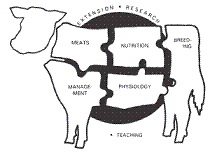Animal Science, Department of

Nebraska Beef Cattle Reports
Date of this Version
2024
Citation
2024 Nebraska Beef Cattle Report
UNL Beef, Institute of Agriculture and Natural Resources, University of Nebraska-Lincoln
Abstract
A 173-day finishing experiment was conducted to evaluate the effects of feeding RAMP (Cargill Corn Milling, Blair, NE) during diet adaptation compared to a traditional forage adaptation program on methane and carbon dioxide emissions, animal performance and carcass traits in beef steers. Cattle were monitored using a calorimetry emission barn to quantify production of methane and carbon dioxide during step 1 of grain adaptation and at two subsequent times while fed a common finishing diet. Feeding RAMP reduced methane by 12% during the initial diet (step 1) compared to a traditional diet that contained 43% forage. When cattle were fed the same finishing diet, there was a 9% reduction in methane due to carryover effects from feeding RAMP during grain adaptation. Cattle fed RAMP tended to increase hot carcass weight by 13 pounds. These data suggest feeding RAMP during grain adaptation instead of forage could be a strategy to reduce methane emissions. The performance benefits from RAMP would further decrease methane production per pound of gain.
Included in
Large or Food Animal and Equine Medicine Commons, Meat Science Commons, Veterinary Preventive Medicine, Epidemiology, and Public Health Commons

